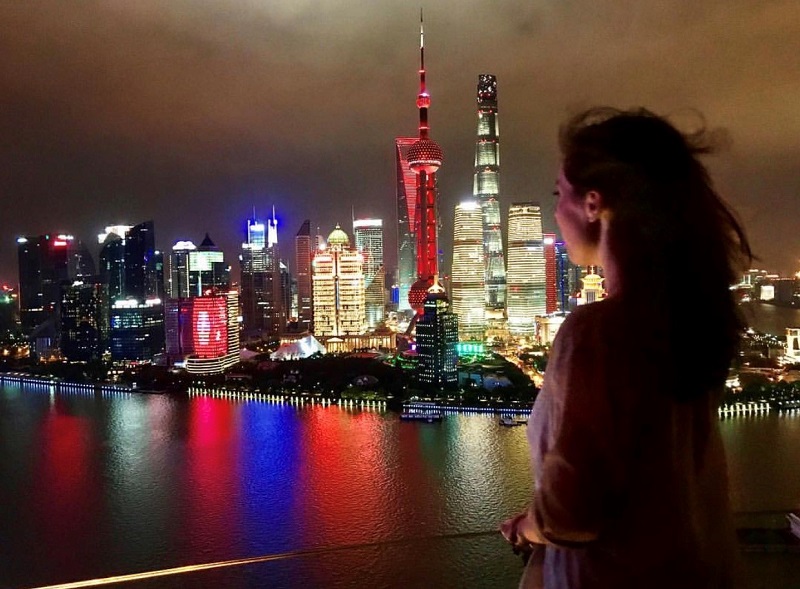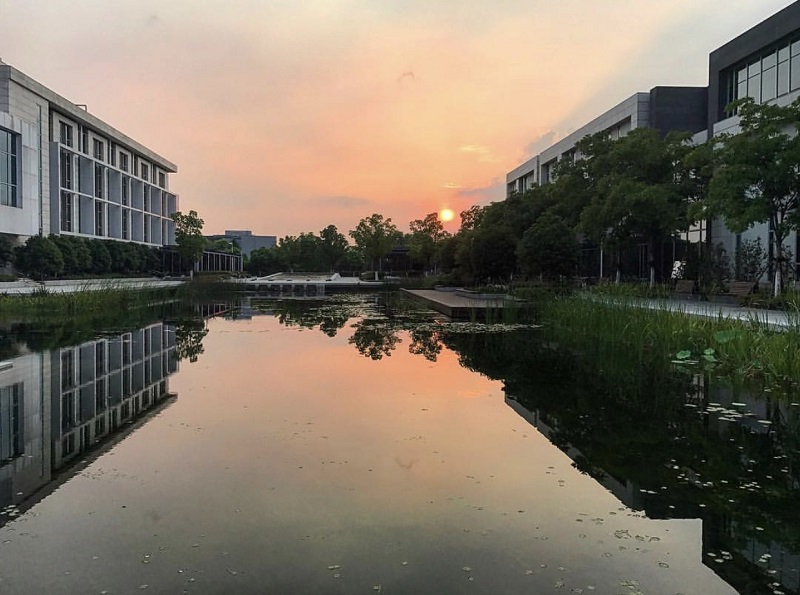
Kelley Reardon (left) with best friend Xing Li
By Kelley Reardon
I remember the feeling of excitement and anticipation when I first stepped onto the Duke Kunshan University campus two years ago. Lush greenery greeted me as I walked past the glass doors and into the pristine white Residence Hall, where the heavy heat of mid-August was immediately replaced by cool air conditioning.
I was checked in to my room by a fellow student ‘ a girl named Xing Li, who would later become my best friend. I was about to start my new role on the Residence Life team. Planning orientation, making nametags and meeting other students packed my schedule in those first few weeks before classes began.
I don’t think I could have predicted then what life was going to be like as a student at Duke Kunshan. Yet the real lessons that I was about to learn would come outside of the classroom.
One of the biggest lessons I learned from my time at DKU and as a graduate student in the international master of environmental policy (iMEP) program was related to communication.
One night, my friend Xing and I were laughing so hard that tears were streaming down our faces. Xing Li said, ‘I think it’s so interesting how we can laugh like this together despite the language and cultural differences between us.’ I hadn’t really recognized this until she pointed it out.
Yet I did experience communication challenges as well, whether I was trying to solve an economics problem with my classmates or discussing a technical issue with the university staff.

Kelley looks over the Shanghai skyline at night
Cultural norms differ between the United States and China, yet DKU is a unique fusion of the two cultures. Eventually, I learned to try to adapt to different people’s communication style. When I attended an intercultural communications workshop at Duke University, these styles became even clearer to me.
In the U.S., people tend to communicate in a very direct verbal manner. However, in China, indirect verbal communication is favored. It seemed better to approach situations from a more indirect standpoint in China to maintain harmony in the conversation. This took time to adapt to, and I am still learning how to do this and simultaneously manage to clearly get my point across.
Challenges like these can actually have the most rewarding outcomes and provide the greatest potential for growth. The Environmental Research Center at Duke Kunshan gave me the opportunity to perform research in and around Indian national parks. This allowed me to experience the research process from start to finish.
I worked with a team to design a household survey, and we collected our own data in the field, analyzed the data and wrote a paper. It was incredible to be in India, and I gained a new appreciation for the cultural and biological diversity of the country while I was there. We were lucky to see so much wildlife in the national parks, from elephants to wild dogs to gaur (Indian bison).
Further, my travel experiences over the past two years, including the trip to India, have allowed me to grow into a more understanding and compassionate person. I still have a lot to learn, but I am so grateful that I had the chance to develop meaningful relationships with people from all over the world.
By living abroad for an extended period of time, I’ve realized that I want to incorporate travel into my career. I would love to explore more international travel opportunities while working for an environmental organization focused on conservation. There are so many more places to see, and by experiencing the world firsthand, I would be able to continue to cultivate a true appreciation of nature, culture and communities across the globe.
I had some pretty crazy and unforgettable adventures during my time as a graduate student ‘ experiencing the hustle and bustle of Shanghai, hiking through bamboo forests for panda research, going on safaris in Indian tiger reserves, trekking through jungles in Thailand and even walking across the country border from China to Vietnam. While these experiences were fun and exciting, the people I was with and met along the way are what really mattered the most to me.
DKU’s tight-knit community made it easy to form lasting bonds with people in my program and beyond. Some of my closest friends are in the master’s programs in global health or medical physics, and Xing Li is an undergraduate.

A sunset shot captured by Kelley at Duke Kunshan
I also feel lucky to have had the chance to spend so much time with my professors and classmates in the iMEP program due to our small class sizes. For instance, my adviser, Binbin Li, took our entire class to her research field site in Sichuan province. We spent two weeks with the staff of the nature reserve, learning about the pandas and conservation efforts there. This kind of authentic and intimate experience is what made my time as a DKU student special.
Travel is so important to me ‘ it makes me feel alive by inciting wonder and awe, and brings so much joy into my life. It has also broadened my acceptance of myself and others, because it has allowed me to understand how life can be lived so differently from what I once considered to be the norm. It has taught me why people’s differences and similarities should be celebrated.
Travel has been important to me in gaining perspective on how the world works in order to better understand the problems I am passionate about solving, such as biodiversity conservation or climate change, which are often global issues.
Lastly, and perhaps most importantly, travel has given me the gift of lifetime friendships. I treasure the people that I met during my time in graduate school, including my classmates, professors, friends from other programs, and research colleagues.
The iMEP program’s Class of 2019 graduated in May (a video of the graduation can be found below). My classmates have landed some incredible roles, including working at an environmental NGO, management consulting and pursuing a Ph.D. at the National University of Singapore.
I am so grateful to have had the chance to grow alongside them as a person and professional in a place like Duke Kunshan, and I’m excited to support them as they continue to make positive impacts in the world.
Kelley Reardon, from the United States, graduated in May as part of the iMEP program’s Class of 2019.

